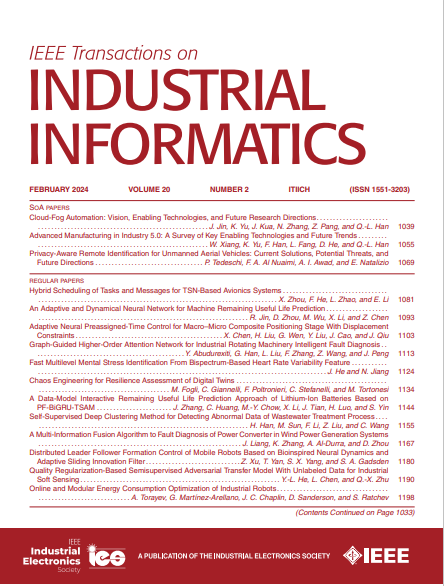An Adaptive Proportionate Robust Diffusion Recursive Least Exponential Hyperbolic Cosine Based Control for Solar Photovoltaic–Wind Driven Doubly-Fed Induction Generator Based Microgrid
IF 9.9
1区 计算机科学
Q1 AUTOMATION & CONTROL SYSTEMS
引用次数: 0
Abstract
This article presents a new control for multirenewable energy sourced microgrid (MG) that performs operational mode change seamlessly with added power quality improvement features. This MG comprises of a wind turbine driven doubly fed induction generator and a solar photovoltaic array. This control presents an adaptive current control based on proportionate robust diffusion recursive least exponential hyperbolic cosine method utilized for fundamental weight extraction. This adaptive control offers a superior convergence rate and noise-free weight estimates, thereby providing significant harmonics reduction from injected grid currents. A change of MG operational mode is due to check imposed by islanding scheme, which functions reliably due to accurate calculation of phase angles provided by multiple delayed signal cancellation (MDSC) frequency-locked loop method. MDSC prefilter mitigates issues of harmonics distortion and dc-offset from input voltage signal, providing accurate estimates. This new control is tested on a developed prototype in the laboratory using a dSPACE MicroLabBox DS1202, under adverse operational conditions.基于比例鲁棒扩散递推最小指数双曲余弦的双馈太阳能光伏-风力微电网自适应控制
本文提出了一种多可再生能源微电网(MG)的新控制方法,该方法可以无缝地改变运行模式,并增加电能质量改进功能。该MG由风力涡轮机驱动的双馈感应发电机和太阳能光伏阵列组成。该控制提出了一种基于比例鲁棒扩散递推最小指数双曲余弦法的自适应电流控制方法,用于基权提取。这种自适应控制提供了优越的收敛速度和无噪声的权重估计,从而提供了显著的谐波减少注入电网电流。磁控阵工作模式的改变是由于孤岛方案的校验,而多重延迟信号抵消锁频环法提供的相位角精确计算使磁控阵工作可靠。MDSC预滤波器减轻了输入电压信号的谐波失真和直流偏置问题,提供了准确的估计。这种新的控制在实验室中使用dSPACE MicroLabBox DS1202在不利的操作条件下对开发的原型进行了测试。
本文章由计算机程序翻译,如有差异,请以英文原文为准。
求助全文
约1分钟内获得全文
求助全文
来源期刊

IEEE Transactions on Industrial Informatics
工程技术-工程:工业
CiteScore
24.10
自引率
8.90%
发文量
1202
审稿时长
5.1 months
期刊介绍:
The IEEE Transactions on Industrial Informatics is a multidisciplinary journal dedicated to publishing technical papers that connect theory with practical applications of informatics in industrial settings. It focuses on the utilization of information in intelligent, distributed, and agile industrial automation and control systems. The scope includes topics such as knowledge-based and AI-enhanced automation, intelligent computer control systems, flexible and collaborative manufacturing, industrial informatics in software-defined vehicles and robotics, computer vision, industrial cyber-physical and industrial IoT systems, real-time and networked embedded systems, security in industrial processes, industrial communications, systems interoperability, and human-machine interaction.
 求助内容:
求助内容: 应助结果提醒方式:
应助结果提醒方式:


